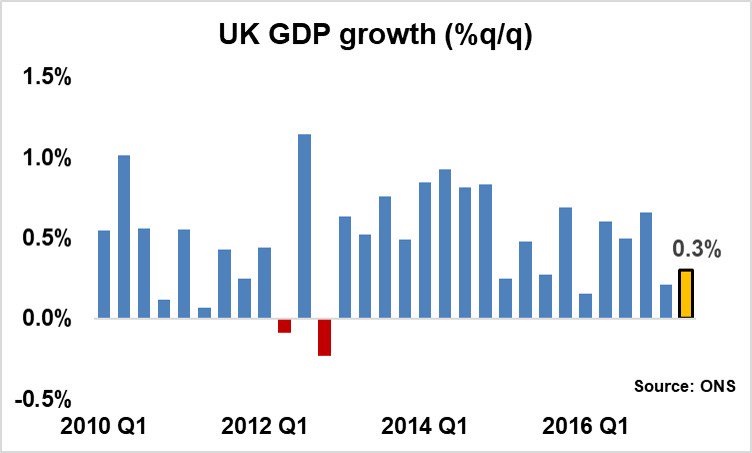Weakest half year for UK economy in five years

The UK’s economy grew 0.3% in the second quarter of 2017, showing modest growth from last quarter’s low.
A report from the Office for national Statistics said that UK economic growth slowed during the first half of 2017, but the economy is now 9.0% above its pre-downturn peak following today’s announcement of a slight upturn. However collectively, it is the weakest half year for UK economy in half a decade.
Two days ago the International Monetary Fund downgraded its forecast for the UK economy, calling its performance “tepid” however in early morning trading, the pound crept up against the dollar and euro, indicating a predicted growth in GDP. Economists have been predicting a slight upturn, to 0.3% growth.
The rate of growth for the first quarter of 2017 was worse than expected, growing 0.2% between January and March 2017. This was the lowest growth for a year, and significantly behind the revised estimate of 0.7% achieved in the final quarter of 2016.
Chris Williamson, chief business economist for IHS Markit, said: “These meagre growth rates indicate that the economy has lost momentum in 2017, and will consequently fail to achieve the 1.8% expansion seen in 2016.
“The second quarter growth was below the 0.4% expansion anticipated by the Bank of England, and therefore suggests we’ll see the central bank revise down its forecasts for the economy next week from the 1.9% growth it has currently penciled-in.
“The confirmation of the lackluster performance of the economy so far this year surely also diminishes the chance of an interest rate hike any time soon, especially as growth prospects for coming months have become increasingly skewed to the downside.”
Steve Allen, head of the Birmingham office at Mills & Reeve and chairman of the British American Business Council, said: “Reflecting the weakest first half of the year in five years, these figures make for worrying reading. Confidence is clearly down in traditionally strong sectors including manufacturing and construction, driven no doubt, by uncertainty around Brexit.
“Slow growth in these traditionally well performing sectors is also due, in part, to many firms sitting on their hands and shying away from making investment decisions until there is some clarity on future trade relations with the EU, our biggest trading partner.
“While the Midlands’ economy relies heavily on manufacturing sectors, thanks to its industrial heritage, it’s promising to see film production showing an upward trajectory. Birmingham in particular has a burgeoning film production and distribution scene, and should the likes of Channel 4 decide to move their headquarters here, it’s likely that this will continue to thrive and contribute significantly to future GDP figures.”










